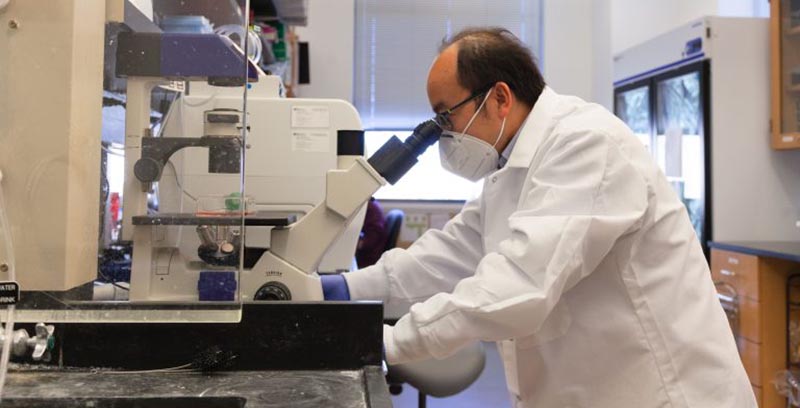April 25, 2022
By Eric Stann | MU News Bureau
The COVID-19 pandemic might have overshadowed the usual concerns about the annual flu season, but the virus continues to be a top priority for Henry Wan, a virologist at the University of Missouri with a joint appointment in electrical engineering and computer science, who believes understanding and preventing influenza remains paramount.
According to the Centers for Disease Control and Prevention (CDC), about 8% of the United States population gets sick from the flu each year. Young children; pregnant women; people 65 years and older; and those with medical conditions, such as asthma or diabetes, are at higher risk of developing serious illness from the influenza virus.

Wan’s long-term goal is to customize the annual influenza vaccine into personalized medicine. As the incoming director of the NextGen Center for Influenza and Emerging Infectious Diseases — which is scheduled to open later this year in fall 2022 — Wan will be one step closer to making his goal a reality. The $6.5 million project will include space for replicating both extreme hot and cold climates, which is an important factor in the study of infectious disease transmission.
Wan’s interest in influenza began after experiencing multiple animal and human infectious disease outbreaks while growing up in a small town on the Yangtze River in central China. He said 60% of infectious disease outbreaks in human populations happen this way: beginning as zoonotic diseases, or diseases that pass between animals and humans with most of the cases starting in animals. To better understand the influenza virus, researchers must first understand how these types of respiratory infectious diseases work.

Years of education and research led Wan to study this phenomenon at the CDC and Mississippi State University prior to joining Mizzou. Now, his research is taking him to a project in support the NextGen Precision Health initiative that will be located 10 miles south of the MU campus on Middlebush Farm.
“We want to look at how we can improve our influenza vaccination by studying both the animal and the human sides of this disease,” Wan said. “Both aspects are equally important in allowing us to execute the necessary research and vaccine improvements. Our work will help us better understand how the disease transmits between humans and animals, how these viruses mutate and affect hosts differently, and how we can make the influenza vaccine better and stronger.”
Wan holds joint appointments in the School of Medicine, College of Engineering and College of Veterinary Medicine. He is also an investigator at the Christopher S. Bond Life Sciences Center. He believes vaccinations can be among the most effective ways to treat influenza; therefore, a large portion of his research is devoted to studying how the vaccine works.
“I use my skills and laboratory experiments to better understand two aspects of influenza transmission and vaccines,” Wan said. “I study transmission to expand my knowledge on how influenza affects different hosts like animals and humans. On the vaccine side, I want to learn how to develop better vaccines and understand their effectiveness, as these types of viruses continue to develop and mutate.”
Wan said COVID-19 and influenza can confuse people because they share similar symptoms, such as cough, runny nose, sore throat, fever, headache and fatigue. They also can both be asymptomatic.
“However, these two diseases are caused by two different viruses, and molecular diagnosis can be used to confirm the type of disease,” Wan said.
When the weather cools, these respiratory diseases are more likely to spread and mutate, giving people different symptoms as that happens.
“The influenza vaccine can significantly reduce disease severity, decrease the likelihood for individuals to be infected and help block virus transmission within the community,” Wan said.
The CDC also recommends preventative actions such as washing hands often with soap and water.
Join an interdisciplinary program that works across campus to solve real-world problems. Become a Mizzou Engineer!